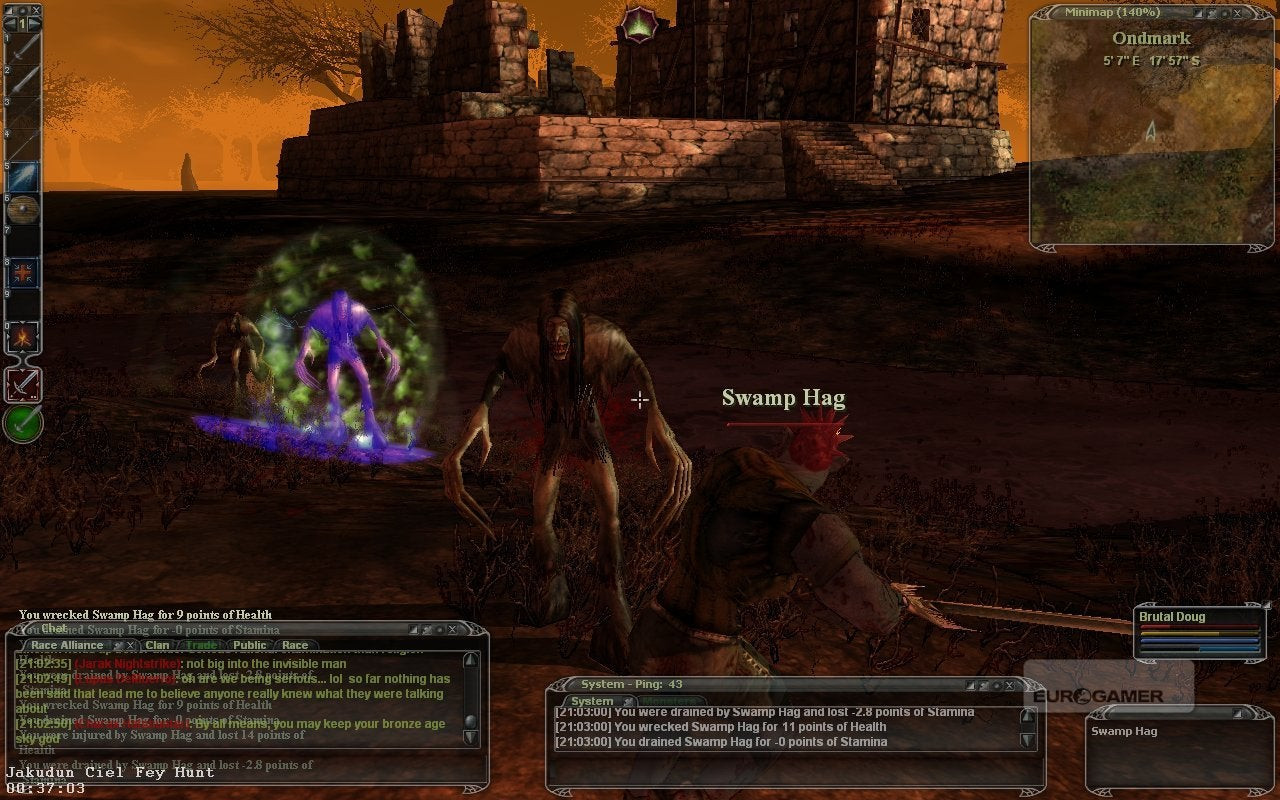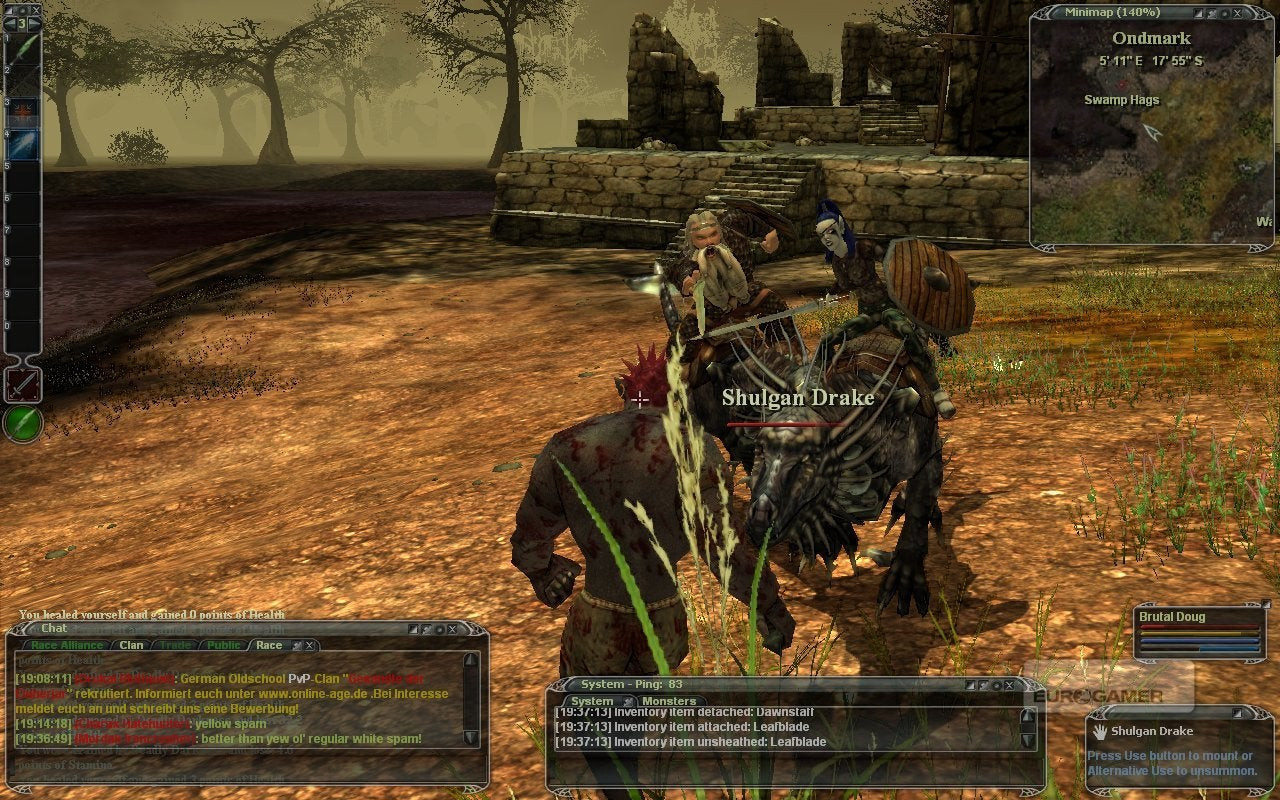Darkfall Online. The name itself carries a certain weight, especially if you’ve been around the online gaming world for a while. Its history is as much a part of its identity as its gameplay, and ignoring that history would be disingenuous. Back when Eurogamer first reviewed Darkfall, it landed a harsh 2/10. The developers at Aventurine were understandably outraged, claiming their logs showed the reviewer had barely spent any time in the game. Eurogamer stood by their reviewer, who insisted they’d played for at least nine hours. A re-review was offered, but Aventurine declined. Intrigued, Eurogamer bought their own account, and here we are, discussing this infamous title.
That’s the condensed version of a story that has much more depth if you choose to delve into it. But even from this brief overview, it’s clear that judging Darkfall Online is no simple task. The shadow of that initial review looms large, even if, like me, you’ve never actually read it, sensing it might be beside the point.
Darkfall Online is, at its core, a fantasy massively multiplayer online role-playing game. This seemingly straightforward description hides another layer of its complex history. In development since 2001, Darkfall is a game born from a distinct vision, one that feels both nostalgic and forward-thinking. Rejecting the class-based systems prevalent in many modern MMOs, Darkfall opts for a skill-based approach. While races exist, their impact is less defining. Much like the classic Ultima Online, progression in Darkfall is driven by your actions. Want to improve your swordsmanship? Start swinging. Need better woodcutting? Get chopping. Even resting contributes to character development.
Couple this with unrestricted open player-versus-player combat – think of the chaos of a rush-hour subway station, but with swords and spells – and full-loot upon death, and you have a game that clearly believes modern MMOs have become overly accommodating. You get the sense that if Aventurine could, they’d wire your keyboard to deliver a mild electric shock every time you’re ambushed while fishing. It’s all in the name of making things matter. Consequences are real in Darkfall Online.
A risky maneuver in Darkfall Online: Overextending for loot can quickly turn deadly in the open PvP world.
Perhaps they have a point about this approach, a sentiment we’ll revisit.
Darkfall Online also stands out with its modern, action-oriented combat system, a departure from the typical timer-based mechanics found in many MMOs. Whether casting spells or firing arrows – and characters can become proficient in both, and more, through dedicated practice – the game shifts to a first-person perspective. Melee combat, however, remains in third-person. Aim matters; what you target, you hit.
Damage output is tied to your skills, but player skill itself plays a much more direct role than in most MMOs. This isn’t a game where you can mindlessly trade blows with a monster, confident that your superior damage-per-second will guarantee victory. Partly due to the combat mechanics, and partly because any passing player is likely to seize the opportunity to attack you in your vulnerable state, take your belongings, and perhaps taunt you as a “care bear.” Friendly fire is always on, making teamwork essential and highlighting the constant risk. Darkfall Online’s combat is undeniably brutal.
While the lethality of the combat system could perhaps be even higher, that’s another point to address later.
Beyond the core gameplay loop lies the endgame – player-controlled cities, warring guilds, and massive sieges. These elements elevate Darkfall Online beyond a simple PvP game, arguably making it the closest you can get to a terrestrial version of EVE Online in terms of player-driven politics and large-scale conflicts, despite any shortcomings it may have.
But before diving deeper into the gameplay, let’s take a detour to fully understand the context surrounding Darkfall Online.
Interlude 1: Aventurine vs. Eurogamer: A Clash of Perspectives
In essence, one side believed they held irrefutable proof, while the other saw no proof at all.
From Aventurine’s perspective, they possessed server logs unequivocally demonstrating that the reviewer who had savaged their game had barely played it. They were prepared to share these logs with Eurogamer, even offering to fly a technician to Eurogamer’s offices to personally verify their authenticity. To them, it was clear: the reviewer was misrepresenting their playtime, and the review was a scandalous misrepresentation.
The vulnerability of death in Darkfall Online: A naked player attempts to recover their corpse and belongings, only to be ambushed again.
Eurogamer, however, viewed the situation differently. They were presented with logs from the developer, data entirely under Aventurine’s control. Eurogamer likely lacked the in-house technical expertise to independently validate the logs’ accuracy. Furthermore, the very nature of digital logs meant their content could be trivially altered, rendering any examination potentially meaningless. If Aventurine were being dishonest, Eurogamer would have no way to definitively prove it.
As long as the reviewer maintained a reasonable claim of having played the game for a sufficient duration, Tom Bramwell, then-editor of Eurogamer, had to support his staff member. To side with the developer against his own writer would have been a damaging precedent.
- It would breed contempt among the writing staff. Any journalist would feel unsupported if their editor prioritized developer claims over their own word.
- It would create an exploitable precedent. Regardless of Aventurine’s honesty in this specific instance, the fact remained: server logs can be manipulated. Setting a precedent of accepting external logs over an employee’s account would invite unscrupulous developers to attempt similar tactics in response to negative reviews in the future.
Of course, a less cynical explanation exists: a technical error causing inaccurate log data. While less likely, the possibility of a simple mistake, rather than malicious intent, would be the most palatable resolution to a truly unpleasant situation.
For the record: Should definitive proof of deliberate deception in this matter ever surface, the consequences for the responsible party should be severe.


